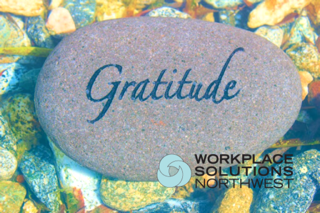
Happy Thanksgiving to everyone!
This time of year we are reminded of all we are grateful for, if only because we have a holiday forcing us to stop, reflect and focus on the positive things in our lives (and our favorite pies). Noticing the good things in our lives and work brings balance and positive feelings, and reminds us of all the good there is in our lives.
You probably won’t be surprised to learn gratitude has been associated with well-being, positive social relationships, positive emotional functioning, and lower dysfunction in numerous studies. In fact, in a study summarizing some of the research, the authors of
Gratitude and Well-Being* found that grateful people were less angry and hostile, depressed, emotionally vulnerable and experienced positive emotions more frequently. Gratitude was also positively correlated with emotional warmth, gregariousness, trust, altruism, and tender-mindedness, being open to one’s own feelings, ideas and values, greater competence, dutifulness, and striving for achievement. Gratitude is associated with a wide variety of personality traits which are conducive to the development and maintenance of positive relationships.
The authors of Gratitude and Well-Being also noted gratitude is not just thankfulness for the actions of another person. It includes appreciation for other people, a focus on what we already have in our lives, feelings of awe, behaviors which express gratitude (such as saying “please” and “thank you”), a focus on the positive in the present moment, positive social comparisons and an appreciation for “what is” arising from the understanding that life is short.
As a mediator working with people in conflict, I know helping people to express appreciation for the other party can have an almost magical effect. It doesn’t make the conflict go away, cause people to forget their resolve or stop disagreeing. What it does is remind us the other person is a human being.
So often in conflict, we place the other person in a two dimensional box. “She’s a controlling jerk.” “He’s a sexist pig.” “She’s a bully.” “He did that to me on purpose to insult me.” We assume the other person has a character flaw or bad intent towards us that made them act a particular way.
When we think like this, we create a caricature of the other person. We forget they have a sense of humor, their own experience, family and friends, a value system, ethics and a very human need to connect or express their competence or passion at work.
Going through the mental exercise of identifying something about the other person to appreciate, and articulating it to them, forces us to step outside the small, constricting box our thoughts have constructed about the other person. If we have to think of the person as having at least one good quality, maybe we will start to question the thoughts we have about them as “all bad.”
Having a regular gratitude practice can also change your attitude about your work and your co-workers. I don’t know anyone who feels they don’t have enough work, accomplishes their “to do” list every day or never has conflict at work. These conditions are stressful, and if we focus only on them, we will lose touch with what is positive in our work and lives.
Here are some practices you can bring into your work life to increase gratitude and positive relationships with both yourself and your co-workers:
- One of the things I ask my coaching clients to do is to start looking at their to do list from the perspective of what they got done that day, and expressing gratitude towards themselves for all they did do. Focusing on what you did and recognizing your to do list couldn’t have been accomplished by a small army in four weeks, let alone just by you in one day, can help you remember you are doing a good job and moving your projects forward.
- List three things every day for which you are grateful at work. This will help you turn your attention from the frustrations and pitfalls and onto what happened that was good or positive. We tend to notice what we focus on. Have you noticed that if you want to buy a new car, the precise car you are interested in tends to show up everywhere you go? That is the power of directing our focus. The same is true with focusing on what is positive.
- If co-workers show up on your list of things for which you are grateful, tell them why you are grateful for them and help them take ownership of whatever they did which helped you out. So many of us deflect praise. Help them take it in and own it.
These practices will help you focus on the positive throughout the year, not just at Thanksgiving. Remembering to authentically tell people they are doing a good job on a regular basis will improve your relationships with them and help them to start focusing on the positive. Remembering there is much to be thankful for in your own life will help you focus on the positive. Take stock of what happens as you do this in your own life and notice if it seems to increase your well-being, your positive interactions with others or other qualities of your life. As I am always asking people, if it helps, what is the downside of doing it? And it might just make things better in general. Happy Thanksgiving!
*Wood, Froh and Geraghty, Gratitude and Well-Being: A review and theoretical integration, Clinical Psychology Review, 2010.
NOV